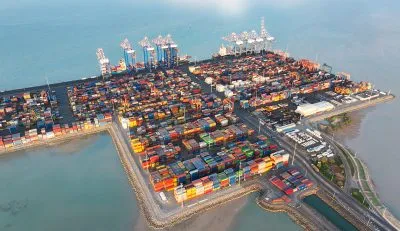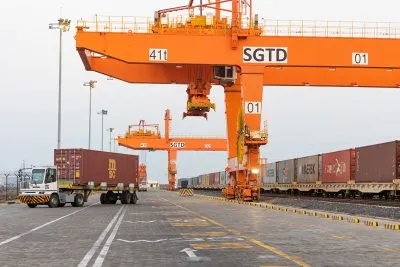Click to see our 2023 ranking of Africa’s Top 250 Companies.
The lions that dominate Africa’s business landscape are flourishing where driven by excellent strategy, top management and well-placed investing. Dynamic businesses in our annual ranking of Africa’s Top 250 Companies – the premier annual survey of the health of African businesses – are showing formidable growth and the promise that this is only the beginning.
It is not that the environment has been favourable, as businesses have been buffeted by a succession of global shocks. The pandemic brought lockdowns, supply-chain disruption, loss of tourism and huge volatility in commodity prices, and much of the continent is not in the clear yet.
As African economies were hoping to accelerate post-Covid recoveries, global central banks including the US Federal Reserve and the UK’s Bank of England tackled inflation by hiking interest rates. In previous cycles, global investors tended to abandon emerging market currencies and rush into dollars.
A move away from emerging currencies would impact the South African rand, which is the most liquid emerging market currency.
Increasing global interest rates and depreciating local currencies increase the debt burden for deeply indebted African governments and make it harder to reissue new debts when existing bonds expire.
How will rising commmodity prices affect Africa?
Russia’s invasion of Ukraine and resulting Western sanctions are also pushing up global prices for oil and gas. This is good news for exporters such as Nigeria – where growth prospects were recently revised upwards – and Angola. But countries in Africa dependent on fuel imports are likely to be badly affected.
Food is another looming crisis exacerbated by the conflict. Food commodity prices had already climbed a record 23% in 2021, with forecasts for 2022 starting at an additional 22% hike and potentially spiralling higher.
Russia and Ukraine are major global producers and exporters of wheat, sunflower oil and other foods. The war and port blockades hinder production and block exports from Ukraine. Russia also halted exports of wheat and some other cereals to protect domestic supply, and sanctions will affect trade.
As urban populations soar in the rest of the continent, demand for wheat is also growing. According to the African Development Bank (AfDB), Africa’s trade with Ukraine was $4.5bn a year, of which half was wheat, and its trade with Russia was $4bn, of which 90% was wheat. Nearly all East Africa’s imported wheat comes from the warring countries.
Food prices are often linked to political unrest. Even though there were many more significant underlying factors, the Arab Spring followed major spikes in the FAO Food Price Index in 2010-11. Food prices are major contributors to growing inflation. Higher food prices will also depress local consumer demand.
Although global rice production is not directly affected, food production – including in many African countries – will also be severely hit by shortages of key fertiliser inputs. War sanctions have affected potash production and exports from Russia and its ally Belarus, and Russia is a key supplier of nitrogen and natural gas used to manufacture fertiliser.
The war and rising inflation may delay the longed-for recovery in tourism, a major contributor to African economies from Mauritius and Kenya to Tunisia and Morocco. Other European demand may be affected, including fruit, flowers and vegetables grown in East Africa.
Furthermore, Africa is among the regions worst affected by the global climate crisis, facing severe storms, floods and drought, and damage to farming and food production. Even if the world succeeds in limiting global warming to 1.5 degrees Celsius, Africa’s GDP will be diminished. Warmer temperatures will have significantly worse effects.
Opportunities amid the gloom
Yet dynamic African businesses will still find great opportunities. There is likely to be renewed interest in African producers of oil and gas, as well as exports of solar energy and hydrogen. Natural gas production in Africa is set to double from 1.3m barrels of oil equivalent per day in 2021 to 2.7m in 2030 as massive new deep-water gas resources come on-stream in Mozambique, South Africa, Senegal, Mauritania and Tanzania.
Some 420bn cubic metres of gas are to come online in the next three decades, including ocean shelf and land-based reserves, while liquefied natural gas (LNG) production is set to recover in Nigeria, Angola, Ghana and Mozambique.
Investors are also stepping up the flow of funds into renewable and clean energies, where Africa has significant geographic advantages over other continents. This includes solar, geothermal and the production and export of hydrogen.
African businesses can seize giant opportunities to improve the productivity of farming and boost the continent’s contribution to domestic and global food production.
In recent decades, Middle Eastern countries and Egypt have turned to Sudan, Ethiopia and other countries for their food supplies. More African companies could make the running and grow and produce food for local and international markets to fill the global supply gap.
In March, the AfDB announced plans to raise $1bn to invest in food production. According to AfDB President Akinwumi Adesina: “If there was ever a time that we needed to drastically raise food production in Africa, for Africa’s food security, and to mitigate the impact of this food crisis arising from this war, it is now.”
According to the World Economic Outlook, published by the International Monetary Fund on 19 April 2022, growth for sub-Saharan Africa is estimated at 4.5% for 2021 and forecast at 3.8% in 2022 and 4% in 2022.
The IMF’s predicted star economies for forecast GDP growth over 2022-27 include: Benin, Democratic Republic of the Congo, Côte d’Ivoire, Djibouti, Egypt, Ethiopia (although civil war is slowing growth this year), The Gambia, Kenya, Mozambique, Rwanda, Senegal, Tanzania and Uganda.
However, Africa’s overall growth lags emerging and developing Asia, where growth is estimated at 6.8% in 2021 and projected at 5.4% and 5.6% in 2022 and 2023, driven by China and India.
Africa’s lions
Every year, the African Business Top 250 Companies charts the rise of innovative, strategic and resilient African businesses that straddle the continent, make huge profits and invest billions into Africa-wide strategies to seize future opportunities.
Telecommunications firm MTN Group soars from #13 to #4 on this year’s ranking after more than doubling its market capitalisation to $24.5bn, up from $11.1bn in 2021.
The company has raised cash by listing its operations in Nigeria, Ghana, Uganda, Rwanda and other countries, also boosting the development of local capital markets. It has ploughed the cash into new networks, infrastructure and data centres. MTN Nigeria is at #18 on the ranking (up from #23), Scancom (MTN Ghana) is #76 and MTN Uganda is a new entry at #105.
Other leading South African businesses spanning the continent include Firstrand (#3), Standard Bank Group (#5), Vodacom (#6), Absa (#16) and Sanlam (#17). Fast-growing giants in other countries include Dangote Cement headquartered in Nigeria (#15) with production capacity of 48.6m tonnes across 10 countries in sub-Saharan Africa.
Sugar Refinery is down from #157 to #185. Morocco’s Attijariwafa Bank (#19) is building a strong group across 14 West and North African countries, including Société Ivoirienne de Banque (a new entry at #213) and CBAO Sénégal.
Market value drives the ranking
The total market capitalisation of the 250 companies on the list is down to $701.4bn, a little lower than $710.2bn in the 2021 survey and far below the $887.1bn recorded in 2018 and the highest level of $948.3bn achieved in 2015. The total market capitalisation, as in most years, is heavily affected by changes at the top of the list.
Changes in methodology mean that the survey focuses ever more heavily on Africa-focused companies which derive at least half their revenues on the continent, and which are accessible to African investors because they are listed on an African stock exchange. The years to 2021 saw nearly $243bn of market cap lopped off by tightening the criteria for companies.
In the current year we have removed African-originating companies which derive less than 50% of their revenues from the continent. The biggest casualty is last year’s #2 ranked global mining giant Anglo American, which had a market capitalisation of $53.2bn in March 2021, although its South African subsidiary Anglo American Platinum still makes the cut.
Others removed include miner South32, Mediclinic International and Steinhoff International, accounting for a combined $14bn in market capitalisation.
Naspers (ranked #1), which first emerged as an Afrikaans media conglomerate, is a global internet giant with its primary listing on the JSE. Since last year’s ranking, the market capitalisation of Naspers is down from $104.2bn to $49.6bn.
The share price has fallen partly because investors are worried about China’s crackdown on tech firms including Tencent, in which Naspers took a huge stake in 2001 and which propelled Naspers to become a global giant.
However, viewed another way, the precipitous fall at Naspers and the removal of Anglo American means the market capitalisation of the rest of the companies in the survey grew by a massive $112bn.
The market capitalisation of the median company, South Africa’s KAP Industrial Holdings (#125), was $848m on 31 March, up 15.7% over last year’s #125 (Tanzania Cigarette Co.), which had market capitalisation of $733m. The market capitalisation threshold to be featured at #250 on the top ranking was $286m this year, up 10.4% compared to $259m last year.
Continued market distortions in Zimbabwe also affect the ranking. Local investors worried about inflation, potential devaluations and cash shortages poured money into the Zimbabwe Stock Exchange, where share prices and the indices continued to soar. For the Top 250 Companies rankings, local share prices are converted at the official rate on the RTGS dollar (ZWL), which still remains at about ZWL$362 to the dollar.
The Zimbabwe Stock Exchange All Share Index climbed more than threefold over the 12 months since last year’s ranking, when Zimbabwean stocks were already distorting the market capitalisation figures. Figures by research house African Markets show the ZSE All Share Index is up 4,645% over two years to 14 April 2022.
Finance is king
Finance firms and banks tightened their dominance of the stock markets, making up 90 of the Top 250 Companies, with total market capitalisation of $227bn, or 32% of the total, up from $168.8bn in 2021 (24% of the total).
The survey has simplified the number of sectors, consolidating metals and mining into “non-energy materials” (ie excluding oil and gas). This sector contributes 38 companies and 25% of the total market capitalisation to the ranking.
The sector includes #2 ranked Anglo American Platinum, Sasol (up from #18 to #8), Kumba Iron Ore (#9), Gold Fields (#10) and Impala Platinum Holdings (#11). If more African miners added local listings to their Canadian or other international listings, the sector would grow.
Consumer non-cyclicals made up 17% of the total market capitalisation across 55 companies. It is heavily dominated by Naspers which made up $49.6bn of the total $119.1bn and contributed to the relative decline. Other companies include Shoprite (#21), Africa’s largest fast-moving consumer goods retailer with 2,400 shops and subsidiaries in 14 countries.
Billions of dollars and other currencies are being poured into building telecommunications infrastructure including data centres and fibre cables and the wider sector continues to pour out profits to investors and grow in importance. There are 17 telecommunications companies in the ranking, contributing $104.1bn or nearly 15% of the total, up from $89bn last year (12.5%).
© Data provided by Emerging Markets Investment Management Limited and also in-house research. Data as at 31/03/2022. Data relates to listed companies only. Listed companies with less than 50% of their revenues in Africa and companies that are not listed or dual-listed on an African exchange were excluded.
Want to continue reading? Subscribe today.
You've read all your free articles for this month! Subscribe now to enjoy full access to our content.
Digital Monthly
£8.00 / month
Receive full unlimited access to our articles, opinions, podcasts and more.
Digital Yearly
£70.00 / year
Our best value offer - save £26 and gain access to all of our digital content for an entire year!

 Sign in with Google
Sign in with Google 



